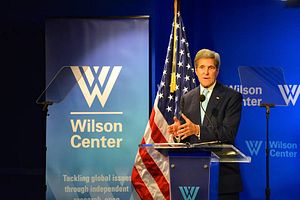The week of October 3 will mark one year since an agreement was reached on the Trans-Pacific Partnership (TPP) as the legislatures of the agreement’s two largest economies begin to tackle ratification. The process in both countries will be complicated and outcomes aren’t guaranteed, but the agreement may yet survive if the leaders that signed the agreement can navigate their legislatures as well as they could navigate the negotiations.
For Japan, the Diet began its extraordinary session on September 26 with ratification of TPP as one of the key items on the legislative agenda. Prime Minister Shinzo Abe’s ruling coalition has enough votes in both chambers to ensure passage but ratification is not completely guaranteed.
For one, the opposition may not have the votes to block TPP, but it still has cards to play. It’s sometimes assumed that the opposition Democratic Party (DP) is in an awkward position with TPP given that its predecessor, the Democratic Party of Japan, initiated Japan’s participation. However, like former U.S. Secretary of State Hillary Clinton’s argument against TPP, their secretary general, Yoshihiko Noda, argued that his party was unsatisfied with the outcome. The DP also has a new leader, Renho, who may be eager to use the TPP debate as an opportunity to display her credibility as a viable challenger to Abe. She is attacking 18 mistranslations uncovered in the text as “serious mistakes” requiring the bills be resubmitted to the Diet and restarting the process from the beginning. There are also other tools available to slow debate, such as walking out of the committee sessions to freeze the clock on official debate.
Then there could be more unpredictable obstacles, like a tabloid uncovering a scandal that derails the debate, similar to the scandal that led Koya Nishikawa, chair of the Diet’s special committee on TPP, to resign, or a natural disaster such as the Kumamoto earthquakes in April and May, which ended the Diet’s consideration of TPP as they shifted their attention to disaster recovery. Events like these are unpredictable but always looming in the background. Still, the Abe administration is determined to complete ratification in the current session and it would take something significant to prevent that.
As for the United States, TPP’s ratification is, to say the least, highly variable. The Obama administration is publicly committed to TPP’s passage but likely to wait until after the November election to begin the formal legislative process in order to reduce TPP’s visibility as a possible campaign issue. This timing gives TPP an extremely small window of opportunity during the lame duck session.
Congress will already have to give considerable attention to approving a budget for Fiscal Year 2017 since the recently-passed “continuing resolution” expires on December 9. Congressional leadership will likely prioritize the budget during the lame duck period in order to avoid a politically damaging government shutdown. Additionally, if the election determines that the Senate will change control in the next Congress, coupled with a win in the presidential election for Clinton, Republican leadership may choose to consider Supreme Court nominee Merrick Garland or other legislation, including TPP, to deny a hypothetical Clinton administration the opportunity to nominate a more liberal justice or shape other legislative outcomes. They may also choose to simply go home after passing a budget for FY17. At this point, there’s no way to know.
If TPP is taken up during the lame duck, there are a variety of options available for congressional consideration of TPP. The “standard” process would be congressional hearings followed by markups (formal committee consideration of the bill) and then floor votes in each house. This process can take several weeks but can occur “in the background” while Congress considers other issues simultaneously. Another possibility is for TPP to be considered and passed in a matter of days with only floor votes and expedited committee action, with no hearings or markups.
Which option is chosen depends on the administration and congressional leadership agreeing on how much debate they would allow, the amount of time necessary for other legislation, and whether the administration can agree with congressional leaders on outstanding issues with TPP. The key outstanding issue is data protection for biologic pharmaceuticals, since Orrin Hatch, chair of the Senate Finance Committee, which has oversight over trade agreements and is influential with Republicans on trade issues, has withheld support for TPP until his concerns are addressed by the administration.
Successful passage is possible but difficult to predict. Those closest to the process seem confident that ratification is achievable, depending on the willingness of the administration and congressional leadership to move forward. Tellingly, no one seems to be thinking practically about renegotiation or the possibility that the process will drag into 2017 or beyond. Experts outside of government are much more pessimistic and are already thinking about what renegotiation might look like and how it would proceed. They believe that the lack of congressional-executive cooperation to this point, along with the presidential candidates’ attacks on TPP, have poisoned the political climate for TPP’s passage. The picture will be clearer after Election Day, but the path remains open for now.
Paul Nadeau is an independent writer based in Tokyo, Japan.
































